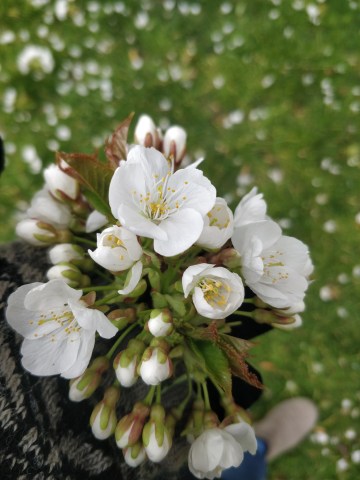Vicious Women….

So apparently I’m a Vicious Woman.
I’m not sure about this. I like to think that when I attend the escrima club I’m just… you know… the tall girl, or the girl-who-really-isn’t-very-good-at-double-stick-blocking-despite-her-best-efforts. However, according to my kung fu friend, it’s important for every martial art society to have a Vicious Woman and he seems fairly convinced I fit the bill. Despite the fact that a) I’m not very good and b) my home-made-lilac-stick-carrying bag has a flower motif on the inside. (Because, let’s face it, if I can undermine macho stereotype, I kinda will….)
Which got me thinking. Specifically, it got me thinking about women and self-defense.
At secondary school, we had a class entitled ‘Common Sense Defense’. We didn’t learn how to hit anything, but we learned skills which were, retrospectively, far more important. We learned when to run, when to scream, when to call the cops. We talked about threats on the street, on the internet, and had level discussions about domestic and sexual violence. Not, I hasten to add, in a ‘be afraid, weak mortals!’ way, but in a genuine, ‘this is a thing you should be aware of’ way which I think is only healthy for any woman to have in her arsenal of know-how.
At LSE’s fresher’s week there was a one-hour class entitled ‘self-defense for women’ in which a rather uncertain brown-belt karate student stumbled through a few kicks and punches, and was taken to task by a vociferous mathematics graduate for not having a useful strategy for wrestling a large man on the floor – at least one which didn’t involve months of training.
After that, as some readers will recall, I learned a little jiu jitsu… and now I learn escrima. And almost the first thing I learned about myself is that instinctively, I don’t actually want to hurt anyone. I just don’t. The urge to send shots wide, the desire to pull a punch, is deeply ingrained. Likewise, even now, a shyness at physical contact, a reluctance to enter someone else’s space and a temptation to recoil at the slightest threat, is still deeply embedded in my psyche. And sure, my teachers, being frankly excellent, have got good at training this out of me – courtesy in part to their uncanny ability to cross a big space in no time while brandishing dangerous weapons – but it is still a part of me, that urge to flinch.
It’s not merely a physical thing. It’s psychological. I avoid conflict. I yield to aggression – not always, but frequently. And often my reasons for doing so are common sense; it is more sensible to back away from a pointless fight, than it is to keep charging forward. I’m reminded, even as I write this, the only times I’ve ever actually seen people fight, in the street, in anger. This was when I was on holiday in South Korea, and I witnessed three street fights in two weeks, in which men with clearly about as martial training as an armadillo battered each other over the head with whatever happened to come to hand. And why? Because societal rules did not permit the loss of face that comes from backing down; and if no side will yield the point, however stupid, what happens next? Nothing smart, is the answer; violence is failure.
Without wanting to generalise too much (she says, generalising hugely) I think it’s fair to say that men are more likely to respond to aggression, with aggression, while women seem inclined to swing the other way. We often back away from aggression, but this can be an instinct which is jumped upon by those who can exploit it. I see a weapon, and I flinch, and in that flinching I have lost the fight. I feel threatened, and I retreat, and suddenly the bully who made that threat is upon me, seeing my vulnerability.
I remember one of the more psychologically interesting exercises that my escrima teachers have. Occasionally in class one of my teachers will pull out a (plastic) knife and advance towards a student. They don’t run, they don’t charge; there’s just the inevitable advance of a threat towards you. First time this happened to me, I did what everyone always does – I backed away, looking for a way out, until there was no where left to run. The strategically more sensible response, (towit: to attack the threat rather than run from it) is nine parts psychological, to only one part martial technique.
I don’t know if the ‘generic’ female reaction to aggression, such as it is, is a genetic thing – I personally doubt it – or a societal one. I am not going to engage in a discussion of what ‘feminine’ actually means in modern society, because that’s a whole other can of worms (though I do invite opinion) but I think we can all agree that there are roles, and attitudes in society that are predominately feminine, and those which are masculine, and within this are gendered responses to aggression. (Discuss?)
Nor do I propose that every woman in the world takes up a martial art – hell no! Sure, there’s a lot in that argument which suggests that martial arts, rather than teaching aggression, teach discipline, but I think it’s also fair to say that a world in which everyone spent several hours a week learning how to clobber each other, would not be a particularly fluffy place.
But if I had one hour at the LSE Fresher’s week to work with women who’ve never done a second of martial arts in their life, anything at all, I would repeat the lessons of my secondary school’s common sense classes. I would invite discussion of domestic and sexual violence, because in not discussing them we only reinforce ignorance and fear, and because by the time violence happens, something’s already gone very, very wrong. I would ask every woman present to stand nose-to-nose with a stranger in the room, to experience that awkwardness, that cringing that comes from having someone else in your personal space. And I would steal one of my teachers’ more excellent lessons, and advance on a stranger with a weapon, knowing that the correct response, absolutely, is to scream and run away, but that there is great strength, and great achievement, in doing so without flinching.





